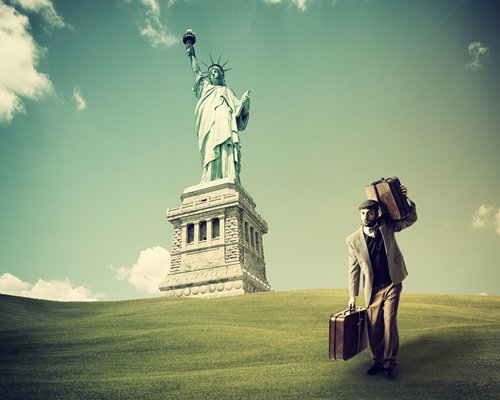HOME >> OPINION
Willy-nilly, US shutting the door on itself
Source:Global Times Published: 2019/9/5 20:13:40

Photo: IC
Nine Chinese students from Arizona State University were recently denied entry by Customs and Border Control Protection (CBP) at Los Angeles International Airport when they flew back from summer holiday in China. They were detained and then sent back to China at their own expense. The students are undergraduates, including some who are due to graduate this semester. So far, despite enquiries from the media and the school, the CBP offered only a terse explanation - "The Chinese students were deemed inadmissible to the US based on information discovered during the CBP inspection."
These are not the only international students who have met trouble while trying to enter the US to attend university. Also sent back this summer were a returning Chinese student who arrived at the Detroit Metro Airport because he had a bulletproof vest in his luggage, and a Palestinian student admitted by Harvard University who was sent back to Lebanon from the Boston Logan International Airport because some of his social media friends were found to have said things deemed by officials to be against the interests of the US. The Palestinian student was allowed to come back only after the incident triggered a widespread protest. And some Asian organizations are now fighting for the nine Chinese students.
While the US has the absolute right to vet visitors and deny entry to anyone seen as a potential threat to homeland security, and the circumstances of some of the incidents are not immediately clear, these cases are not at odds with an unsettling trend. There has clearly been increased scrutiny on international students coming to the US.
Data from the US State Department shows that the number of student visas granted has declined 42.5 percent to just 389,579 in the fiscal year 2018, from 677,928 three years earlier. The drop is partly due to the extended process for background checking of the applicants. American universities, to which international students contribute close to $40 billion a year in tuition and boarding and lodging, are so concerned that in July, leaders from more than two dozen prominent colleges - including Harvard, MIT, Princeton and Yale - sent a joint letter to the Department of Homeland Security, the Secretary of State and Congress to express their dismay.
If the current climate continues, international students may find themselves in a tough situation when they graduate from colleges in the US. According to one analysis by the National Foundation for American Policy, the denial rates for H-1B visas, which are required for foreigners to work in the US, has risen from 6 percent in the fiscal year 2015 to 33 percent in the second quarter of fiscal year 2019.
The trend spooked even conservatives who may not be considered natural supporters of immigrants. In a commentary published on the website of Fox Business, "Restricting H-1B visas likely cost US more than 1M new jobs in 2018," Sean Spicer, former press secretary for Donald Trump's White House, harrumphed: "Our immigration policies should encourage the doctors, engineers, researchers, scientists and other highly educated graduates of our institutions from other countries to remain and flourish here in the US rather than be forced to take what they have learned here and excel elsewhere."
President Trump, who is famous for a hard line on illegal immigrants, has been talking about shifting the American immigration policy to a merit-based system. In May, the president announced a proposal to achieve this goal that would eliminate or largely strip away family-based and lottery green cards and build a point system awarding immigrants who speak English, are educated and have high skill levels.
A merit-based immigration policy is supported by a large number of people in the US. Even some people, who frown upon the president's other policies like the inhumane incarceration of immigrants and the costly border wall, are enchanted by a future that highly skilled immigrants can bring to this country, and start to consider the otherwise intolerable crackdown on illegal immigrants as the necessary price to pay.
Policy changes take time or may not eventually happen. And the current reality offers no evidence that the Trump administration is for highly skilled immigrants as opposed to the rest. If nothing is done immediately to stop the bleeding of international students and skilled foreign workers, it won't take long for the public to realize that Trump's supposed welcome mat for skilled immigrants doesn't exist. And hidden beneath is a future US that has its door shut to outsiders, the reins of the future firmly in the hands of people with light skin.
The author is a New York-based journalist and Alicia Patterson fellow. rong_xiaoqing@hotmail.com
Posted in: VIEWPOINT